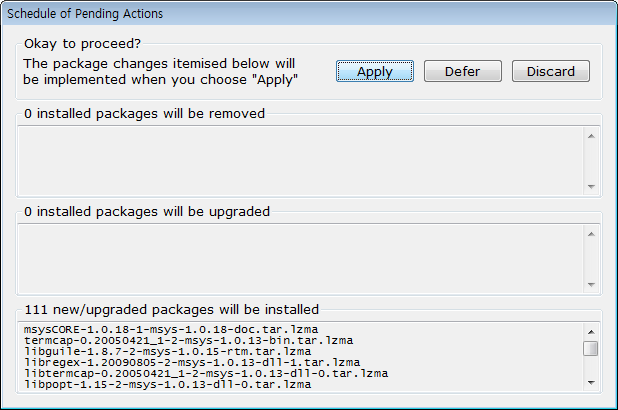
Ffmpeg Build Visual Studio
Marco Pracucci I love building products. Infrastructure Engineer at and. Every while I publish some articles and thoughts here.
Jun 5, 2015 - After following the compilation instructions, developers can include. I'm using Windows 10 Build 10130 with Visual Studio Community 2015. Is it possible to compile the sourcecode from ffmpeg in visual studio 2010? And build your career. Is it possible to compile ffmpeg in visual studio 2010?
• Introduction is a free video library that can record and convert audio and video data. FFMpeg is under GNU Lesser General Public License, but FFMpeg also uses some third party library which maybe under GNU General Public License. So before using FFMpeg library, you'd better spend some time on the license. FFMpeg includes the following libraries: • libavcodec: All of the video and audio encoders and decoders. • libavformat: Demuxers and muxers for audio and video formats. • libavutil: Useful utils of FFMpeg. Get FFMpeg Source Code There are no formal releases of FFMpeg; however, you can get the FFMpeg source code on a daily basis.
Svn://svn.mplayerhq.hu/ffmpeg/trunk For example, you can checkout the source code using TortoiseSVN, Compiling FFMpeg FFmpeg is developed under Linux, but it can be compiled under most Operating Systems. Gta 5 android apk free download without survey. For Windows, FFMpeg can be compiled with MSYS and MingGW. If you have setup MSYS and MingGW systems correctly, you can compile FFMpeg under its folder. • Cleanup former build results. Make distclean• Setup build parameters./configure --enable-shared --disable-static --enable-memalign-hack If there are no errors, and config.mak and config.h were generated, you can build the library, and then, if you want, you can install them into the MSYS environment. Make make install Using FFMpeg in Your Visual C++ Environment • Create inttypes.h and stdint.h if you don't have them. Provided in the above link is a copy of these two files.
You can get them from another place if you want. • Set up additional include directories and additional library directories.
By default, these folders are under your MSYS folder, for example: /usr/local/include /usr/local/lib• Add FFmpeg's shared libraries, including libavutil.lib, libavcodec.lib, and libavformat.lib. • Include the FFMpeg header: #include #include Using the FFMpeg code There is an example within FFMpeg, output_example.c.
But if you have copied code from this example, following tips may ensure you compile successfully. • Add the required casts. • Change snprintf to _snprintf. Ndquangr 9-Nov-10 16:29 9-Nov-10 16:29 Thank you very much for this useful tutorial. I have done all steps, and it built successfully.
But when I run the example, it show exception: 'The procedure entry point url_fclose could not be located in the dynamic link library avcodec-52.dll' I don't understand this error, because url_fclose is defined in libavformat/avio.h, not libavcodec include folder. Does anybody have any idea about this? I use Visual C++ 2005 Express Edition, ffmpeg 0.6.1. This exception also takes place when I use Visual Studio 2008.
Thank you in advance! Yeah, that entry point thing is weird - it's as if it's looking for a function in the wrong dll.
I bet if you look closely at the last few lines after running make, you'll see some errors like: libswscale/swscale-0.dll Creating library file: libswscale/libswscale.dll.a lib.exe /machine:i386 /def:libswscale/swscale-0.def /out:libswscale/swscale-0.lib make: lib.exe: Command not found make: [libswscale/swscale-0.dll] Error 127 (ignored) I know this kuz i had this same problem. These errors are because you need to have lib.exe in your path so ffmpeg can find it. You'll also need mspdb80.dll or mspdb90.dll or whatever in the path too. Lib.exe is in: 'C: Program Files (x86) Microsoft Visual Studio 9.0 VC bin' or 'C: Program Files Microsoft Visual Studio 8 VC bin' or whatever. Depending on what version of VS you want to use and your VS path. And mspdb80.dll/mspdb90.dll is in C: Program Files (x86) Microsoft Visual Studio 9.0 Common7 IDE or C: Program Files Microsoft Visual Studio 8 Common7 IDE or whatever depending on your version of VS and your VS path.
Then right click my computer - properties - advanced - environment variables --- append the above 2 strings to the variable named 'Path'. Then you probably have to restart mingw. Then run make clean from inside mingw. Then rebuild your project with the new dll and.lib files. Then note that the lib files you were using probably had names like libavcodec.lib, libavdevice.lib, etc and the new ones have names like avcodec-53.lib, avdevice-53.lib, etc.
And eat a snickers. Not too many though. And give me one.